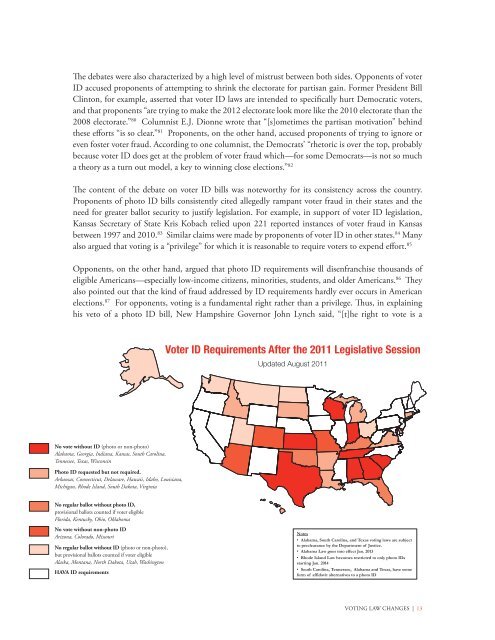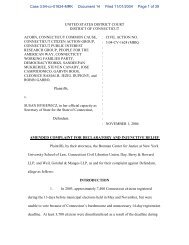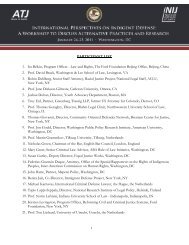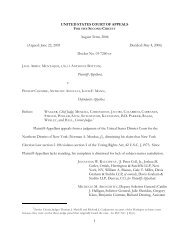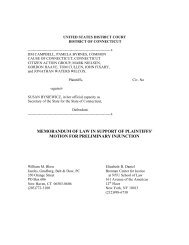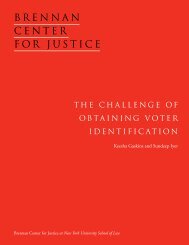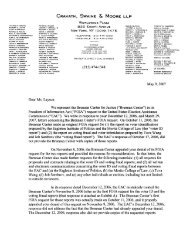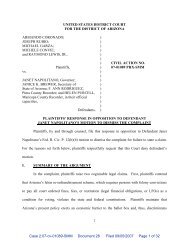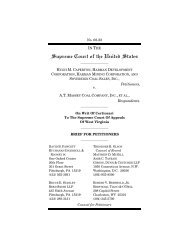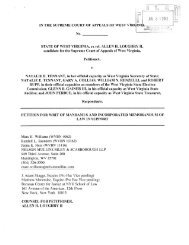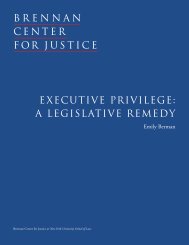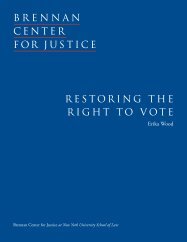BRENNAN CENTER FOR JUSTICE
BRENNAN CENTER FOR JUSTICE
BRENNAN CENTER FOR JUSTICE
Create successful ePaper yourself
Turn your PDF publications into a flip-book with our unique Google optimized e-Paper software.
The debates were also characterized by a high level of mistrust between both sides. Opponents of voter<br />
ID accused proponents of attempting to shrink the electorate for partisan gain. Former President Bill<br />
Clinton, for example, asserted that voter ID laws are intended to specifically hurt Democratic voters,<br />
and that proponents “are trying to make the 2012 electorate look more like the 2010 electorate than the<br />
2008 electorate.” 80 Columnist E.J. Dionne wrote that “[s]ometimes the partisan motivation” behind<br />
these efforts “is so clear.” 81 Proponents, on the other hand, accused proponents of trying to ignore or<br />
even foster voter fraud. According to one columnist, the Democrats’ “rhetoric is over the top, probably<br />
because voter ID does get at the problem of voter fraud which—for some Democrats—is not so much<br />
a theory as a turn out model, a key to winning close elections.” 82<br />
The content of the debate on voter ID bills was noteworthy for its consistency across the country.<br />
Proponents of photo ID bills consistently cited allegedly rampant voter fraud in their states and the<br />
need for greater ballot security to justify legislation. For example, in support of voter ID legislation,<br />
Kansas Secretary of State Kris Kobach relied upon 221 reported instances of voter fraud in Kansas<br />
between 1997 and 2010. 83 Similar claims were made by proponents of voter ID in other states. 84 Many<br />
also argued that voting is a “privilege” for which it is reasonable to require voters to expend effort. 85<br />
Opponents, on the other hand, argued that photo ID requirements will disenfranchise thousands of<br />
eligible Americans—especially low-income citizens, minorities, students, and older Americans. 86 They<br />
also pointed out that the kind of fraud addressed by ID requirements hardly ever occurs in American<br />
elections. 87 For opponents, voting is a fundamental right rather than a privilege. Thus, in explaining<br />
his veto of a photo ID bill, New Hampshire Governor John Lynch said, “[t]he right to vote is a<br />
Voter ID Requirements After the 2011 Legislative Session<br />
Updated August 2011<br />
No vote without ID (photo or non-photo)<br />
Alabama, Georgia, Indiana, Kansas, South Carolina,<br />
Tennessee, Texas, Wisconsin<br />
Photo ID requested but not required.<br />
Arkansas, Connecticut, Delaware, Hawaii, Idaho, Louisiana,<br />
Michigan, Rhode Island, South Dakota, Virginia<br />
No regular ballot without photo ID,<br />
provisional ballots counted if voter eligible<br />
Florida, Kentucky, Ohio, Oklahoma<br />
No vote without non-photo ID<br />
Arizona, Colorado, Missouri<br />
No regular ballot without ID (photo or non-photo),<br />
but provisional ballots counted if voter eligible<br />
Alaska, Montana, North Dakota, Utah, Washington<br />
HAVA ID requirements<br />
Notes<br />
• Alabama, South Carolina, and Texas voting laws are subject<br />
to preclearance by the Department of Justice.<br />
• Alabama Law goes into effect Jan. 2013<br />
• Rhode Island Law becomes restricted to only photo IDs<br />
starting Jan. 2014<br />
• South Carolina, Tennessee, Alabama and Texas, have some<br />
form of affidavit alternatives to a photo ID<br />
voting LAW CHANGES | 13


